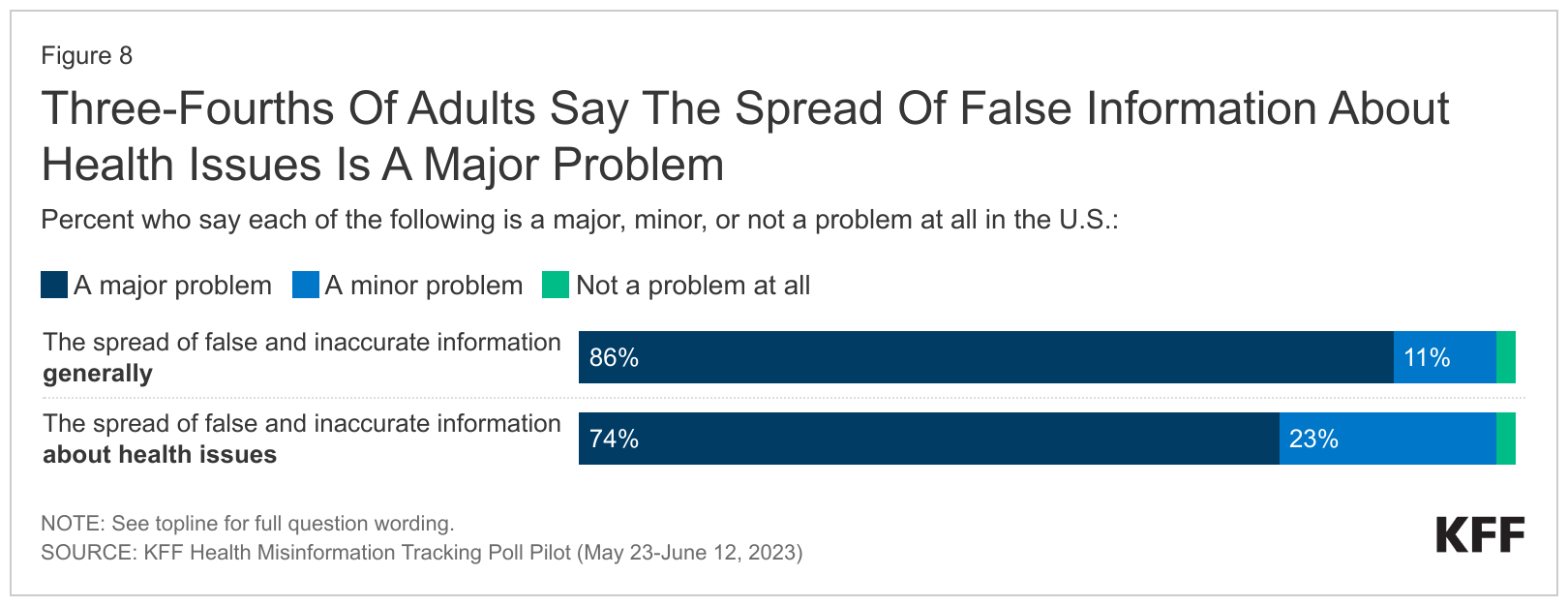Lopes, L., Kearney, A., Washington, I., Valdes, I., Yilma, H., & Hamel, L. (2023). KFF Health Misinformation Tracking Poll Pilot. KFF. https://www.kff.org/coronavirus-covid-19/poll-finding/kff-health-misinformation-tracking-poll-pilot/Summary
The KFF Health Misinformation Tracking Poll Pilot delves into the widespread issue of health misinformation, spotlighting the COVID-19 pandemic.
The poll zeroes in on health misinformation during the COVID-19 era. Misinformation about COVID-19 vaccines, notably their impact on pregnancy and fertility, stands out. KFF’s goal is to monitor and decode the spread of health misinformation, particularly in the most vulnerable communities.
Key Findings
The Core Issue: Misinformation about COVID-19 vaccines, especially concerning pregnancy and fertility effects.
The Aim: Grasp the dynamics of health-related misinformation, focusing on the hardest-hit communities.
Widespread but Wavering: Health misinformation is everywhere, but not all buy into it. A significant chunk is undecided, hinting they might be influenced by factual data.
Demographic Differences: Black and Hispanic adults, those less educated, and Republican leaners are more susceptible to misinformation.
Media’s Double-Edged Sword: Local TV and network news earn trust, but social media platforms are viewed skeptically.
Implications
Misinformation Matrix: While many encounter false health claims, only a fraction see them as entirely accurate. A significant number are on the fence, indicating potential sway by genuine information.
Trusted Voices: Doctors reign supreme as the most trusted health information source. Government bodies like the FDA and CDC follow, albeit with lesser trust. Local and network TV news are reliable news sources for many.
Specific False Claims: The poll identified several false claims related to COVID-19 and vaccines, reproductive health, gun violence, and the Affordable Care Act.
Exposure and Belief in Health Misinformation: 96% of adults have heard at least one of the ten health-related misinformation items in the survey. The most common misinformation was related to COVID-19 and vaccines.
Education plays a pivotal role in shaping views on COVID-19 misinformation.
Degree Matters: 60% with college degrees dismiss all five surveyed false claims about COVID-19 and vaccines. In contrast, only around 40% without a degree do the same.
Worrying Stats: Alarmingly, approximately one in five individuals from rural areas (19%), those with only a high school education or less (18%), Black adults (18%), Republicans (20%), and independents (18%) believe that four or five of the surveyed misinformation items are likely or certainly true.
Source
Citation
@article{infoepi_lab2023,
author = {{InfoEpi Lab}},
publisher = {Information Epidemiology Lab},
title = {KFF {Health} {Misinformation} {Tracking} {Poll} {Pilot}},
journal = {InfoEpi Lab},
date = {2023-08-26},
url = {https://infoepi.org/posts/2023/08-26-KFF.html},
langid = {en}
}
